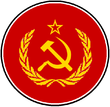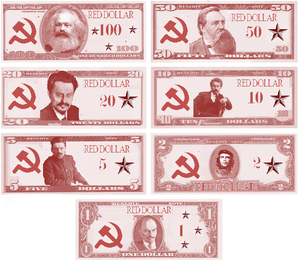Western Union of Soviet Socialist Republics
This article refers to a nation which is currently in a state of inactivity. You can help make the article reflect that or ask on the talk page for further information. |
Western Union of Soviet Socialist Republics | |
|---|---|
| Motto: "The People United." | |
| Anthem: National Anthem of the West Soviet Union | |
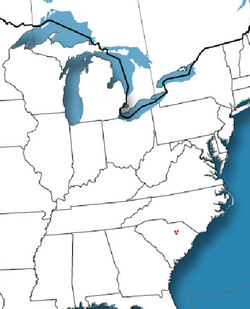 Location(s) of WUSSR claims | |
| Capital | Yebrinsburg |
| Largest city | Carolligrad |
| Official languages | English, French, many others at divisional levels |
| Demonym(s) | Wussar, West Soviet |
| Government | Communist Union/Federation of Socialist Republics |
• President | Grigori Baryshnikov (GCP) |
• Premier | Sergei Ostrovsky (TPW) |
| Legislature | National People's Assembly of the WUSSR |
| Establishment | February 7, 2012 |
| Population | |
• Census | 29 |
| Currency | Red Dollar ☭$ |
| Time zone | Eastern: UTC-5 Summer: UTC-4 Central: UTC-4 Summer: UTC-3 |
Website National Website | |
The Western Union of Soviet Socialist Republics, or the WUSSR is a union of socialist and communist republics, four of which are currently landlocked by the Eastern United States and one is landlocked by Burkland. These republics are allowed to have a regional head, but are mostly ruled by the central government. The union was created in an attempt to stabilize the area which had been left estranged by the former micronations that have been built there. It is also an attempt at creating a large communist governmental entity in the former "Western World," beginning in the Southeastern US.
History
January 2012: The Month of Failed Nations
In the beginning month of the year 2012, Hugo I had lead four nations at different points in time before having all of them fail consecutively. The supposed main cause of this is that most of his followers in these nations were incompetent and had razed these nations via idiocy into the ground. Another cause purported was that the actually ingrained citizens felt disconnected from their governments.
A Final Attempt
At the end of the month, the president proposed a final attempt at staying in prominent micronationalism. He called upon his more prominent followers to assist him in creating a new nation which would stand up to time and idiocy. Their suggestions came and went, ending up with a confederation of kingdoms and colonies. The reason that monarchies were chosen was because of the relatively low population of the new empire.
The Rollover Into Communism
In one final attempt after a heartfelt maturing process in the micronational world, the Chairman realized that he believed that communism was the answer. Knowing that he leaned leftward from the start, most of his followers continued on with him, assisting in the now much more democratic government. Some were skeptical of the new system, though. Eventually, the nation's politics and assembly became stable.
Advancement Era
In the beginning months of 2012, the president agreed with the National People's Assembly on a new plan to advance the industry and agriculture in all states of the WUSSR. All republics were asked to double their agricultural growth by the end of the year, and that all major industrial centers increase their production by half. This was all in the hopes that the nation would soon become a prominent power in its region. The president also began attempts at expanding the union's diplomatic power among the communist micronations of the community. All of these efforts continue today.
Military Reforms
In the early summer of 2012, military reforms were enacted within the nations at the call of upset citizens who did not want the military to take up the budget without being useful. The president proposed that a new system should make military personnel work to improve the nation's infrastructure and general production. And so, the 2012 Military Reforms began, making the People's Army work at constructing a better and safer nation, and the Navy helping new states rise to greatness and produce food via state owned fisheries.
Expedition Northward
With the military's new structure in place, the president then asked permission of the National People's Assembly to organize a naval expedition to the Great Lakes region of North America to establish new states near the homes of citizens' friends and family. The expedition allowed the foundation of the Canadian Democratic Republic, the first republic outside of the former United States after its first week. After that, the president and his team continued on southward to Wisconsin, closer to more family of the presidential family. This part of the expedition was at first thought to be a bust, for none of the family had much interest in the nation at first. However, a cousin of the president later decided to become a citizen. Later on, the president and his team convinced them to establish a new state within the nation. The expedition ended on July 8, 2012.
Republican Movement
During the fall of 2012, a new movement began within the WUSSR. This movement, calling itself the Wussar Republican Movement, stated that it stood for the expansion of Wussar politics to include people from all points on the spectrum. The members of this movement also state that "Wussar Nationalism" was a major part of their doctrine as well. This included the "Iron-Will Democracy" wished for by the Wussar people (democracy always in the hands of the electorate, never trampled upon, and the common heritage of most citizens and their tendency toward intellectualism and political activism. President Baryshnikov claimed that there was no need to suppress his own people's will, remaining passive and planning talks with these dissenters.
Government
The governmental structure of the WUSSR is a union of republics ruled over by the national assembly. Within the assembly, the president heads the internal affairs, and the Premier heads external affairs. Certain governmental organizations will be created to assist with the daily running of the Union.
People's National Assembly
The People's National Assembly is the legislative branch of the WUSSR government. They create laws and documents made to improve and adapt the nation every day. The assembly meets commonly and is always deciding on new laws. Within the assembly, a representative from each republic of the union meets with other leaders to discuss the laws and politics of the nation.
President
The president of the WUSSR makes sure that laws are relevant, useful, ethical, and just. The president has the power to speak within the assembly, as well as veto or approve a proposed bill. They also must deal with the finances of the nation. Equality for workers and all people is also to be assured by the president.
Premier
The Premier is the head of state operations. They must plan out military and peace keeping operations. They are basically a lead commander of the WUSSR People's Armed Forces. In addition to military operations, the Premier also supervises national government projects and makes sure that they are completed safely and quickly.
Administrative Divisions
The republics within the WUSSR are all allowed their own representative and regional president. The purpose of these republics is to make ruling the nation simpler and allow for the people to have special communities to grow in an grow themselves.
Below is a list of the republics within the WUSSR:
| Republic | Capital | Regional President | Location | Map | Size | Population | Date Incorporated | Notable Facts |
|---|---|---|---|---|---|---|---|---|
| Bates City | Matthew Burklandssen (GCP) | New York | 
|
approx 21.1015625 ft sq | 1 | 2/7/2012 | Smallest Republic, Regional President is also Burklandi President | |
| New Berlin | Grigori Baryshnikov (GCP) | Southern Kershaw Co, SC | 
|
approx .05 mi sq | 2 | 2/7/2012 | Former home of the capital of the nation. | |
| Leuchtendestadt | Bré Lloyd (GCP) | Eastern Kershaw Co, SC | 
|
approx .05 mi sq | 2 | 2/7/2012 | Known for eccentricity. | |
| Proletaria | Jean Richards (TPW) | Western Ontario, Canada | 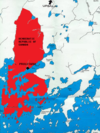
|
approx 10 mi sq | 13 | 6/27/2012 | First West Soviet Republic outside of America, Second of the Republics formed after Expedition Northward. | |
| Carollisgrad | Sergei Ostrovsky (TPW) | Southern Kershaw Co, SC/Western Lee Co, SC | 
|
approx .06 mi sq | 3 | 2/7/2012 | Largest Republic | |
| Arborville | Markus Baryshnikov (MAR) | Southern Kershaw Co, SC | 
|
approx .06 mi sq | 3 | 3/14/2012 | Home of the Market Party, Semi-Autonomous | |
| Great River | Ivan Vanetsov (GCP) | La Crosse County, Wisconsin | 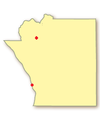
|
approx 1.75 mi sq | 5 | 7/4/2012 | Only republic to touch the Mississippi River, Second of the Republics formed after Expedition Northward. |
There is also a special administrative district of the same name surrounding the capital of Yebrinsburg. This district was created by the national assembly and an agreement between the citizens of the New Branden SSR and Evergreen ASR to create a more unified and beautiful capital for the nation. This district has a mayor, who is not allowed to participate in national politics, so as to avoid corruption.

Foreign relations
The WUSSR hopes to have a successful outreach program to other micronations.
| Nation | Relations | Notes | Requesting Party | Date Requested | Date Accepted | End of Relations |
|---|---|---|---|---|---|---|
| More de facto then official, mainly a result of the founder having dual citizenship in Burkland. | Burkland had close relations with predecessors of WUSSR | Mutual | Talks since 2/6/2012 | 2/10/2012 (start of official communications) | N/A | |
| Formal Talks | The NSSR and WUSSR have very similar goals, and there have been talks of union | Mutual | 2/21/2012 | 2/21/2012 | February 2012 | |
| Treaty of Recognition and Partnership | The two nations have an agreement to recognize each other and allow free travel of either nation's citizens | WUSSR | 4/3/2012 | 4/8/2012 | N/A | |
| Formal Relations | Both leaders have opened talks and are asking each other for foreign recognition. | Schwanensee | 4/30/2012 | 5/1/2012 | N/A | |
| An informal friendship between two nations. | Former Burklandi leader heavily influenced the decision | Mutual | 7/30/2012 | 7/30/2012 | N/A | |
| Formal relations in which two nations influence each other's ideals and decisions. | Relations at first took a wrong turn, but were quickly saved and both the FUSR and WUSSR shortly entered relations after an executive order from Federal Union leader James Thompson and a vote from the NPA. | WUSSR | Talks since 7/30/2012 | 7/31/2012 | N/A | |
| Formal international relations, Informal relations between the public and leaders. | First Relations with a micronation from the United Kingdom. | WUSSR | Talks since 8/12/2012 | 8/12/2012 | N/A |
If you wish to become engaged in foreign relations with the WUSSR, please contact us at this adress.
Law and order
The WUSSR's laws are made in the People's National Assembly. These laws are then put into action within the nation to ensure that all the basic needs of the people are covered. These laws may be repealed in another session depending on the need for it.
Rights
The government gives the citizens of the WUSSR the following rights:
- Free Speech
- Allowance to Foreign Communication
- Food, Shelter and Water
- Freedom of Thought and Expression
- Freedom of Travel
- Freedom from Discrimination Based on Ethnicity, Sexual Orientation, or Religion
- Equivalent Income for All According to Ethic
- Safety From Corporate Greed
- Safety at One's Occupation
Law Enforcement
Each republic has their own branch of local law enforcement which are run by their respective regional presidents. These keep the peace at a regional level. Also, there is a national police force called the WUSSR Politsiya and Internal Peace Service (WPIPS). These police enforce laws put in place by the assembly, and make sure that the rights of the people are not trampled upon.
National Symbols
All communist and socialist symbols are welcome within the nation. The national flag holds two black corners with white outlines to indicate the West Imperial heritage of the union. Also, in place of a hammer and sickle, a combination of a gear, hammer and grains are used. This symbolizes the anti-war policies and combination of industry, agriculture and physical labor within the nation. Typical national colors are red and gold, with occasional black and silver used to represent the union. Socialist stars are also commonplace in national symbolism.
Military
The military of the WUSSR is organized as having a naval and ground forces branch. These two branches combine to pack a devastating blow towards the forces meaning to stop the WUSSR's progress. These branches are well equipped and trained by some micronational standards. However, when not at war, the military is made to work at the improvement of their nation on the homefront, building up the infrastructure and foundations of a stronger nation.
People's Army
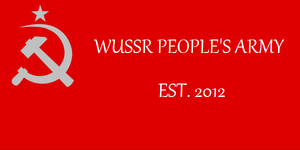
The People's Army is the land-based branch of the military. The army trains regularly and cleans and learns to maintain its equipment. Mock battles are also held to train and also in celebration of either foreign victory or for the nation's pride. The soldiers of the army are armed with airsoft and BB firearms during times of peace and light war. During heavy battles, soldiers are instructed to use .30-06 bolt-action rifles and AR-15 assault rifles modified to be used as heavy assault weapons.
At home during peacetime, the army works on building up existing cities and states within the union. Roads, buildings, logging camps and other industrial structures for the empowerment of the nation and its workforce.
The naval forces of the WUSSR are not as heavily trained as the army, for the nation is not near many large water bodies. Although, that is not to say that the navy is not trained at all. Rescue missions and naval invasions are sometimes practice in the possibility that these skills will be needed. There are two ships within the Imperial Fleet, both of which are armed with non-lethal weapons, and are regularly used as state-owned fishing boats to supply seafood to the nation.
The navy also serves as an expeditionary force for the government, scouting out areas with applicants to become citizens of the WUSSR in order to found republics or territories around these areas. They also build up the foundation for new states to become just as powerful as already existing republics.
Economy
The WUSSR is fairly well off by micronational standards. It has a fairly high income rate, and its redistribution and equality of income is actually fairly and truly successful. It is a mostly import economy, but also relies on exports via the internet. There is also plenty of foreign aid coming from private US citizens who care greatly for the union.
Red Dollar (☭$)
The Red Dollar (or Socialist Dollar) is the proposed and somewhat tested currency of the WUSSR. It was designed to mimic the American dollar in use and design. Instead of being grey and or green, the Red Dollar has (as given by the name) a pale red color. Also, in place of historical American leaders and government seals, it holds Communist Leaders and symbols. There are also hopes that, if successful, the Red Dollar will become the standard currency of many Socialist and Communist micronations.
Current Exchange Rates:
- ☭$1.00 RED=$0.87 USD
- ☭$1.00 RED=$0.90 CAD
- ☭$1.00 RED=€0.70 EUR
- ☭$1.00 RED=£0.56 GBP
- ☭$1.00 RED=¥5.54 CNY
- ☭$1.00 RED=¥69.13 JPY
Environment
The WUSSR is located within a very humid and hot environment, full of southern pines and sweetgum trees. The land is relatively approximately 100 ft above sea level, resulting in a partially coastal and partially forested climate. During a typical summer, the temperature can reach a high of 95 °F (35 °C) and a low of 60 °F (15.5 °C). During the winter, the average high is 55 °F (12.7 °C) and the normal low is 30 °F (-1 °C). There is adequate rainfall for the area, with moderate amounts of precipitation. The wettest season is typically winter, followed by a very wet March.
Demographics
Census Taking
The government takes five censuses every year. The first is just a general census, which acts as a survey of the number of citizens, and what they want improved. The second is an Ethnic census to be sure of the different races of the country, making sure that cultural differences are taken care of before any tension happens. An optional sexuality census takes place to be sure that issues with sexuality are taken care of.
Ethnicity
The union is mostly of European decent, however there is a minority of Native American people. The minor racial characteristics add up to the nation being mostly German, Norse, British and Greek, with partial French, Russian and Polish genes added. This was as of the 2012 Ethnicity Census
Sexuality & Gender
The WUSSR has a majority heterosexual populous. Bisexuals made up parts of the population, and there were two homosexuals. There was also one Male to Female transgendered person. This was as of the 2012 Sexuality Census.
Religion
The nation is mostly christian, with Lutheranism and Catholicism being of high percentages and unaffiliated Christians can be found. Agnostics and atheists make up other parts. There are small minorities turning to Buddhism, Paganism and Islam. This was as of the 2012 Religious census.
Culture
Holidays
| Date | English name | Notes |
|---|---|---|
| January 1 | New Year's Day | Celebrated with fireworks, naturally. |
| February 7 | Foundation Day | Day the WUSSR was founded. |
| April 30 | Communist Victory Day | To commemorate the valiant effort of Communists to bring down the fascist reich in Nazi Germany. |
| May 1 | May Day/International Workers' Day | To commemorate workers worldwide. |
| July 2 | Day of the Americas | Celebrates the independence of the nations of the Americas. Celebrated between Canada Day and American Independence Day. |
| November 1 | Superfluous Conflict Day | Day mourning the those who have died in wars that were completely unnecessary (ie Grenada). |
| December 20-January 3 | Winternus | Days off in accordance with rest of the world's winter holidays. |
| December 26 | Soviet Remembrance Day | The day the Soviet Union officially fell. |
Customs
Workday/Schooling
The workday of citizens typically lasts from 7:30 to 16:00 or 17:00 on a regular day. A typical day revolves around work or schooling for a citizen of the nation. Throughout the day, a citizen will regularly fraternize with friends or foreign workers and work diligently on the task at hand.
Home
The typical citizen will stay at home most days, eat a meal and discuss the day with their family. As it gets later, a citizen will go on the internet or telephone to communicate with friends and family, or work on a project or games while doing schoolwork if they are a student, or simply resting from work.
Weekend
On a weekend,the normal citizen will go out and work on personal projects which need completion, or fraternize with foreign friends in America, Canada, Europe or even other micronations.
Sport
The typical citizen plays either soccer or basketball. There are not enough citizens to start a national league or government association for these sports. Other times, citizens will perform the act of sustenance fishing or hunting for deer, squirrel or rabbit.
Media

The WUSSR government and all of its people have access to American television and other outside media. There are some restrictions like the covering some possible nudity and pornographic censorship in the nation.

